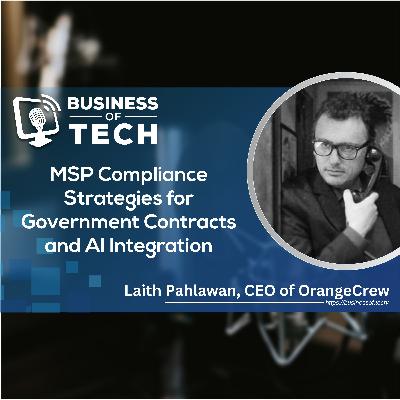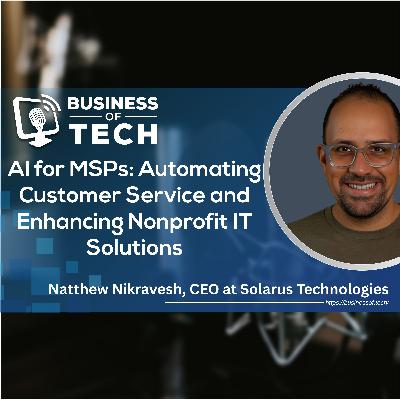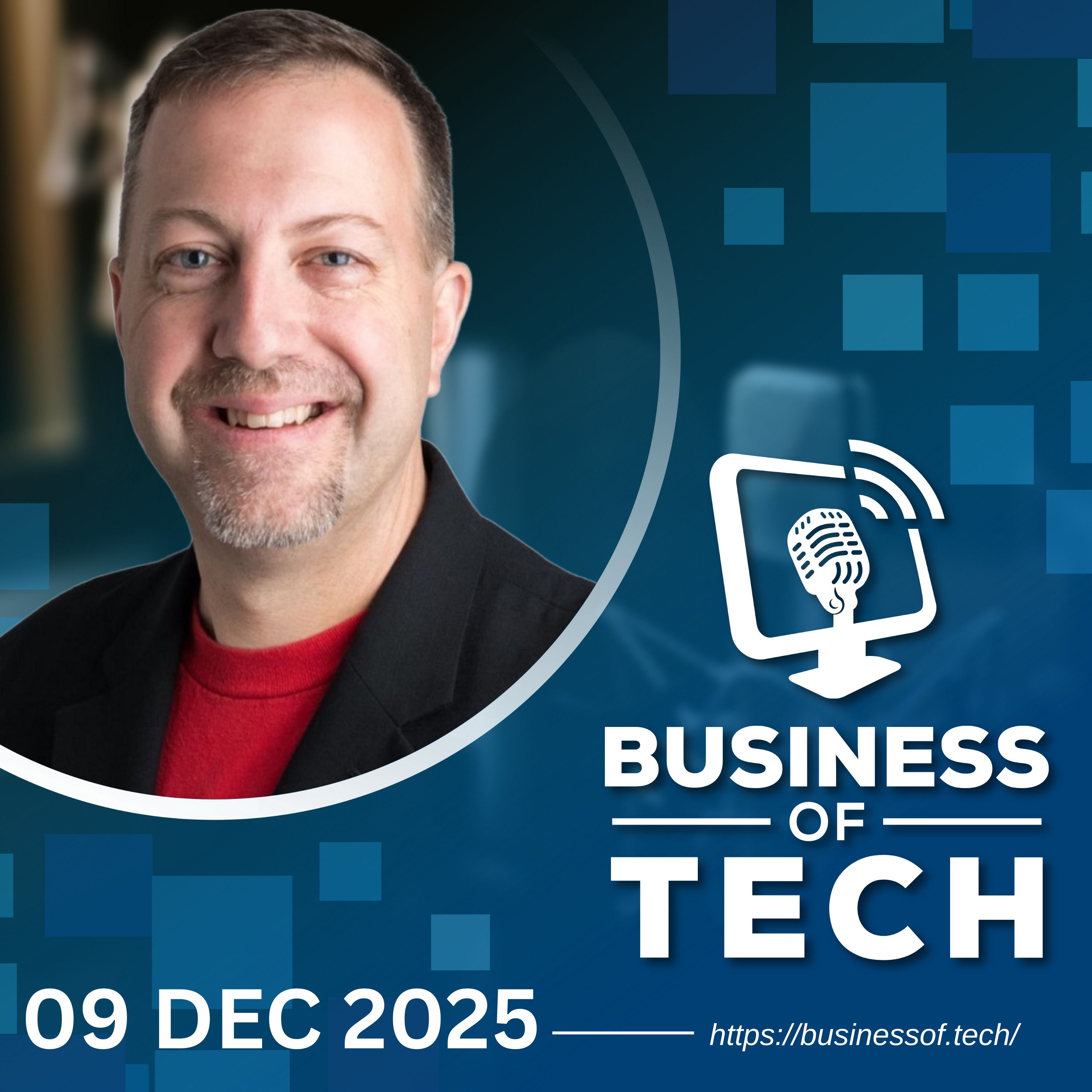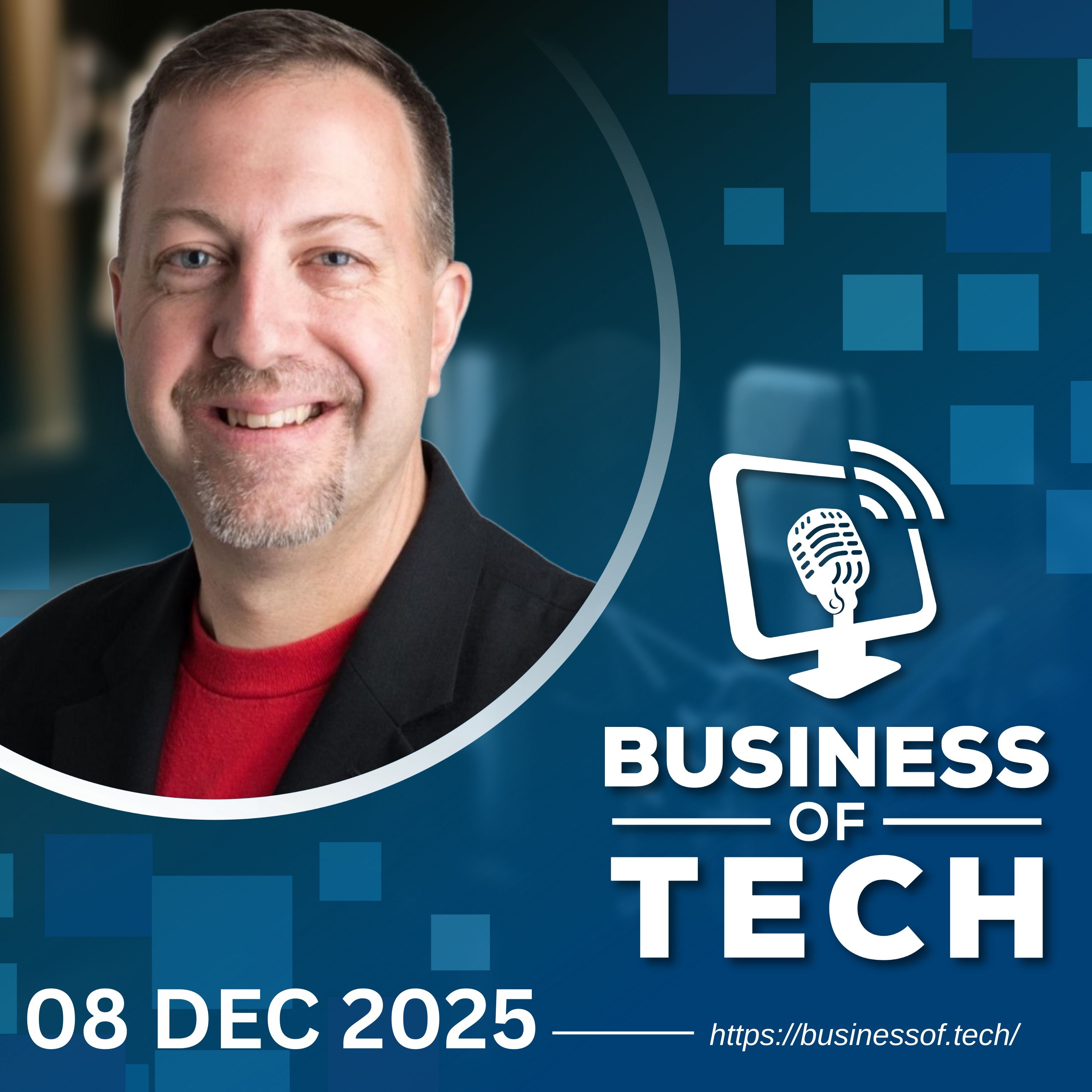Discover Business of Tech: Daily 10-Minute IT Services Insights
Business of Tech: Daily 10-Minute IT Services Insights

Business of Tech: Daily 10-Minute IT Services Insights
Author: Dave Sobel
Subscribed: 136Played: 19,432Subscribe
Share
© Copyright 2019-2024 MSP Radio
Description
In 10 minutes daily, The Business of Tech delivers the latest IT services and MSP-focused news and commentary. Curated to stories that matter with commentary answering 'Why Do We Care?', channel veteran Dave Sobel brings you up to speed and provides resources to go deeper. With insights and analysis, this focused podcast focuses on the knowledge you need to be effective, profitable, and relevant.
1843 Episodes
Reverse
The conversation centers on the evolving role of automation in Managed Service Providers (MSPs), particularly the implementation of human-in-the-loop AI systems. Mathieu Tougas, CEO of Mizo Technologies, emphasizes that while automation can significantly enhance efficiency—reporting a 26% increase in technician capacity and a 30% reduction in escalations—maintaining human oversight is crucial for ensuring service quality. This approach allows technicians to delegate low-value tasks to AI agents while focusing on higher-value customer interactions, thereby preserving the essential human element in service delivery.Tougas outlines the methodology behind these efficiency gains, which involves analyzing ticket resolution times before and after deploying Mizo's solutions. The data indicates that technicians can handle more tickets in less time, which can lead to reduced staffing needs without compromising service quality. He also addresses common misconceptions among MSPs regarding AI, particularly the fear of losing control over service quality when delegating tasks to automated systems. Instead, he argues that AI should be viewed as a tool to enhance technician capabilities rather than replace them.The discussion also touches on the importance of integrating AI tools into existing workflows without causing disruption. Mizo Technologies employs a two-week fine-tuning period to adapt its systems to the specific processes of each MSP, ensuring a smoother transition and minimizing the need for extensive retraining. This gradual approach allows organizations to build trust in the AI systems while optimizing their service desk operations.For MSPs and IT service leaders, the key takeaway is the necessity of balancing automation with human oversight to maintain service quality. As the industry moves towards greater automation, understanding the right contexts for AI deployment and ensuring robust processes are in place will be essential for maximizing efficiency and customer satisfaction. Embracing AI thoughtfully can lead to significant operational improvements while still addressing the critical need for human interaction in service delivery.
💼 All Our SponsorsSupport the vendors who support the show:👉 https://businessof.tech/sponsors/ 🚀 Join Business of Tech PlusGet exclusive access to investigative reports, vendor analysis, leadership briefings, and more.👉 https://businessof.tech/plus 🎧 Subscribe to the Business of TechWant the show on your favorite podcast app or prefer the written versions of each story?📲 https://www.businessof.tech/subscribe 📰 Story Links & SourcesLooking for the links from today’s stories?Every episode script — with full source links — is posted at:🌐 https://www.businessof.tech 🎙 Want to Be a Guest?Pitch your story or appear on Business of Tech: Daily 10-Minute IT Services Insights:💬 https://www.podmatch.com/hostdetailpreview/businessoftech 🔗 Follow Business of Tech LinkedIn: https://www.linkedin.com/company/28908079YouTube: https://youtube.com/mspradioBluesky: https://bsky.app/profile/businessof.techInstagram: https://www.instagram.com/mspradioTikTok: https://www.tiktok.com/@businessoftechFacebook: https://www.facebook.com/mspradionews Hosted by Simplecast, an AdsWizz company. See pcm.adswizz.com for information about our collection and use of personal data for advertising.
Robbie Bach, former president of Microsoft's Entertainment and Devices Division, discusses his transition from technology executive to author of political techno-thrillers, focusing on his latest book, The Blockchain Syndicate. The narrative explores themes of digital identity, misinformation, and the vulnerabilities of modern institutions, emphasizing that technology itself is neutral; it can be used for both beneficial and harmful purposes. Bach highlights the character of Tamika Smith, a military veteran, as a lens through which to examine leadership in a complex landscape of technology and public trust.Bach elaborates on the psychological and technical aspects of his story, particularly the implications of digital identity and authenticity. He notes that the plot involves a blackmail scenario linked to a character presumed dead, raising questions about the authenticity of digital communications. This reflects broader concerns about cybersecurity, where vulnerabilities are often exploited rather than created anew. Bach emphasizes the importance of grounding his narrative in real-world technology and experiences, blending factual research with creative storytelling.The conversation also touches on the governance of technology, critiquing current regulatory approaches that tend to be reactive rather than proactive. Bach argues that effective governance requires forward-thinking leadership capable of anticipating future challenges, particularly in areas like AI and blockchain. He stresses the need for businesses, including small and medium-sized enterprises, to engage with these issues beyond mere compliance, advocating for a broader sense of responsibility that includes stakeholder value.For Managed Service Providers (MSPs) and IT service leaders, Bach's insights underscore the critical role they play in navigating the complexities of technology governance and cybersecurity. By understanding the vulnerabilities inherent in digital systems and advocating for responsible practices, MSPs can better support their clients in mitigating risks associated with misinformation and identity fraud. The episode serves as a reminder of the importance of ethical considerations in technology deployment and the need for proactive engagement in shaping a secure digital future.
💼 All Our SponsorsSupport the vendors who support the show:👉 https://businessof.tech/sponsors/ 🚀 Join Business of Tech PlusGet exclusive access to investigative reports, vendor analysis, leadership briefings, and more.👉 https://businessof.tech/plus 🎧 Subscribe to the Business of TechWant the show on your favorite podcast app or prefer the written versions of each story?📲 https://www.businessof.tech/subscribe 📰 Story Links & SourcesLooking for the links from today’s stories?Every episode script — with full source links — is posted at:🌐 https://www.businessof.tech 🎙 Want to Be a Guest?Pitch your story or appear on Business of Tech: Daily 10-Minute IT Services Insights:💬 https://www.podmatch.com/hostdetailpreview/businessoftech 🔗 Follow Business of Tech LinkedIn: https://www.linkedin.com/company/28908079YouTube: https://youtube.com/mspradioBluesky: https://bsky.app/profile/businessof.techInstagram: https://www.instagram.com/mspradioTikTok: https://www.tiktok.com/@businessoftechFacebook: https://www.facebook.com/mspradionews Hosted by Simplecast, an AdsWizz company. See pcm.adswizz.com for information about our collection and use of personal data for advertising.
Laith Palhawan, CEO and founder of OrangeCrew, has successfully transitioned his managed IT services company into the public sector by becoming GSA certified, allowing him to provide IT services to government agencies. This shift has required a deep understanding of compliance and security requirements that differ significantly from those in the private sector. In the public sector, clients expect adherence to strict standards and predefined solutions, which contrasts with the more flexible and responsive approach typically found in private business engagements.Pahlawan's experience highlights the challenges of profitability in the managed services landscape, particularly when working with government contracts that often yield lower margins of 10-15%. He emphasizes the importance of strategic partnerships and effective business analysis to maintain sustainable margins. By utilizing tools like Power BI and Kaseya, OrangeCrew can track time and resources spent on each client, allowing for informed decisions about which clients to prioritize and which to decline based on profitability and demand.The episode also delves into OrangeCrew's innovative use of artificial intelligence (AI) to enhance internal operations and client services. Pahlawan has developed a centralized database that integrates various data sources, enabling the use of AI to analyze client interactions and identify potential issues proactively. This system not only improves operational efficiency but also positions OrangeCrew as a forward-thinking MSP capable of offering advanced solutions to clients, particularly in the realm of AI.For MSPs and IT service leaders, the insights shared by Pahlawan underscore the necessity of adapting to evolving client needs, particularly regarding compliance and AI integration. As businesses increasingly rely on AI for operational efficiency, MSPs must enhance their understanding of data management and automation to remain competitive. The conversation serves as a reminder that embracing new technologies and strategic partnerships can lead to sustainable growth and improved service delivery in a challenging market.
💼 All Our SponsorsSupport the vendors who support the show:👉 https://businessof.tech/sponsors/ 🚀 Join Business of Tech PlusGet exclusive access to investigative reports, vendor analysis, leadership briefings, and more.👉 https://businessof.tech/plus 🎧 Subscribe to the Business of TechWant the show on your favorite podcast app or prefer the written versions of each story?📲 https://www.businessof.tech/subscribe 📰 Story Links & SourcesLooking for the links from today’s stories?Every episode script — with full source links — is posted at:🌐 https://www.businessof.tech 🎙 Want to Be a Guest?Pitch your story or appear on Business of Tech: Daily 10-Minute IT Services Insights:💬 https://www.podmatch.com/hostdetailpreview/businessoftech 🔗 Follow Business of Tech LinkedIn: https://www.linkedin.com/company/28908079YouTube: https://youtube.com/mspradioBluesky: https://bsky.app/profile/businessof.techInstagram: https://www.instagram.com/mspradioTikTok: https://www.tiktok.com/@businessoftechFacebook: https://www.facebook.com/mspradionews Hosted by Simplecast, an AdsWizz company. See pcm.adswizz.com for information about our collection and use of personal data for advertising.
The episode reviews the outcomes of predictions made for 2025, highlighting the evolving role of automation and AI in Managed Service Providers (MSPs). Key findings indicate that while generative AI has improved data accessibility, it has not fully resolved existing reporting issues related to data quality and governance. Additionally, the anticipated widespread adoption of autonomous IT systems among small and medium-sized businesses (SMBs) has not materialized, as many still rely on traditional remote monitoring and management (RMM) tools. The episode emphasizes that AI governance and advisory services have become central to modern MSP offerings.Further analysis reveals that while AI-driven legal services gained traction, MSPs have not widely adopted these as packaged offerings. Instead, they have focused on AI compliance and regulatory advisory services. The discussion also touches on the mixed results of fraud prevention becoming a standard service, with significant growth in some sectors but uneven adoption across the board. The episode concludes with a scorecard of predictions, noting a few clear successes in AI governance and readiness consulting, while highlighting a notable miss regarding decentralized MSP models.Looking ahead to 2026, the episode presents several predictions that reflect the increasing importance of automation in IT services. It suggests that MSPs whose revenue models still depend heavily on human labor will face pressure to adapt, as automation becomes the primary driver of service scalability. The discussion also raises concerns about accountability in automation, predicting that individuals may be held responsible for failures in automated systems, emphasizing the need for robust governance frameworks.The implications for MSPs and IT service leaders are significant. As automation becomes the production system for IT services, providers must focus on governance, risk management, and advisory roles to differentiate themselves in a competitive landscape. The episode underscores the necessity for MSPs to evolve their service offerings and business models to align with these trends, ensuring they remain relevant and capable of delivering value in an increasingly automated environment.
💼 All Our SponsorsSupport the vendors who support the show:👉 https://businessof.tech/sponsors/ 🚀 Join Business of Tech PlusGet exclusive access to investigative reports, vendor analysis, leadership briefings, and more.👉 https://businessof.tech/plus 🎧 Subscribe to the Business of TechWant the show on your favorite podcast app or prefer the written versions of each story?📲 https://www.businessof.tech/subscribe 📰 Story Links & SourcesLooking for the links from today’s stories?Every episode script — with full source links — is posted at:🌐 https://www.businessof.tech 🎙 Want to Be a Guest?Pitch your story or appear on Business of Tech: Daily 10-Minute IT Services Insights:💬 https://www.podmatch.com/hostdetailpreview/businessoftech 🔗 Follow Business of Tech LinkedIn: https://www.linkedin.com/company/28908079YouTube: https://youtube.com/mspradioBluesky: https://bsky.app/profile/businessof.techInstagram: https://www.instagram.com/mspradioTikTok: https://www.tiktok.com/@businessoftechFacebook: https://www.facebook.com/mspradionews Hosted by Simplecast, an AdsWizz company. See pcm.adswizz.com for information about our collection and use of personal data for advertising.
Matthew Nikravesh, CEO and co-founder of Solarus Technologies, discussed the evolution of managed services in response to the increasing demand for cloud solutions, particularly Azure, during the pandemic. Solaris Technologies, founded in 2012, focuses on providing managed services primarily to nonprofits and small to mid-sized businesses. The company has implemented an automated cloud management platform in partnership with Nerdio, which has enabled them to efficiently deploy Azure Virtual Desktops and streamline support processes for their engineers.The conversation highlighted the importance of automation in reducing operational inefficiencies. Solarus Technologies has integrated automation tools, such as PIA, to manage user onboarding and ticket dispatching, achieving a 35% automation rate for incoming tickets. However, Nikravesh acknowledged that the journey toward effective automation is iterative, requiring ongoing adjustments to improve performance. The company has also seen significant benefits from automating user onboarding processes, which have reduced the back-and-forth communication typically associated with new hires.Nikravesh also addressed the challenges faced by nonprofits in adopting AI technologies, noting that many organizations struggle with data readiness and security. To assist clients in overcoming these hurdles, Solarus Technologies collaborates with an AI consultant to conduct readiness assessments, ensuring that clients can effectively leverage AI tools when they are prepared. This proactive approach aims to help nonprofits focus on their missions rather than IT concerns.For MSPs and IT service leaders, the discussion underscores the necessity of evaluating tool stacks and vendor partnerships strategically. Nikravesh emphasized the importance of smart revenue growth, advising MSPs to assess their client relationships and eliminate those that do not contribute positively to their bottom line. As the industry continues to evolve, the integration of cloud services and AI will remain critical topics for MSPs, necessitating a focus on delivering value while managing operational complexities.
💼 All Our SponsorsSupport the vendors who support the show:👉 https://businessof.tech/sponsors/ 🚀 Join Business of Tech PlusGet exclusive access to investigative reports, vendor analysis, leadership briefings, and more.👉 https://businessof.tech/plus 🎧 Subscribe to the Business of TechWant the show on your favorite podcast app or prefer the written versions of each story?📲 https://www.businessof.tech/subscribe 📰 Story Links & SourcesLooking for the links from today’s stories?Every episode script — with full source links — is posted at:🌐 https://www.businessof.tech 🎙 Want to Be a Guest?Pitch your story or appear on Business of Tech: Daily 10-Minute IT Services Insights:💬 https://www.podmatch.com/hostdetailpreview/businessoftech 🔗 Follow Business of Tech LinkedIn: https://www.linkedin.com/company/28908079YouTube: https://youtube.com/mspradioBluesky: https://bsky.app/profile/businessof.techInstagram: https://www.instagram.com/mspradioTikTok: https://www.tiktok.com/@businessoftechFacebook: https://www.facebook.com/mspradionews Hosted by Simplecast, an AdsWizz company. See pcm.adswizz.com for information about our collection and use of personal data for advertising.
The episode features a discussion on the current state of profitability and revenue growth within the Managed Service Provider (MSP) industry, highlighting that 2024 marks the fifth consecutive year of strong profitability. Despite this positive trend, revenue growth has cooled compared to the rapid increases seen from 2021 to 2023, with organic revenue growth peaking at 25% before declining to around 10.6%. This shift has led to concerns that MSPs may be under pressure; however, profitability metrics indicate that the industry remains healthy, with best-in-class firms achieving significantly higher earnings than their median peers.Peter Kujawa of Service Leadership elaborates on the factors influencing these trends, noting that while profitability has improved, wage inflation has impacted service gross margins. The data reveals that the best-in-class MSPs maintain a W2 ratio that allows them to generate more revenue per employee compared to their median and bottom quartile counterparts. This efficiency is crucial as the industry matures, with many MSPs now facing the challenge of adapting to a more competitive landscape where automation and AI are becoming increasingly important.The conversation also touches on the evolving compensation structures within MSPs, emphasizing the importance of incentive pay over base salaries. Best-in-class firms tend to offer higher variable pay percentages, which are tied to performance metrics that employees can control, thereby motivating better outcomes. This approach contrasts with the bottom quartile, where compensation structures may not align as effectively with performance, potentially leading to complacency.For MSPs and IT service leaders, the key takeaway is the necessity of embracing operational efficiency and automation to remain competitive. As the market continues to mature, those who invest in automation and refine their compensation strategies will likely see improved profitability and growth. The episode underscores the importance of understanding market dynamics and leveraging data-driven insights to make informed business decisions.
💼 All Our SponsorsSupport the vendors who support the show:👉 https://businessof.tech/sponsors/ 🚀 Join Business of Tech PlusGet exclusive access to investigative reports, vendor analysis, leadership briefings, and more.👉 https://businessof.tech/plus 🎧 Subscribe to the Business of TechWant the show on your favorite podcast app or prefer the written versions of each story?📲 https://www.businessof.tech/subscribe 📰 Story Links & SourcesLooking for the links from today’s stories?Every episode script — with full source links — is posted at:🌐 https://www.businessof.tech 🎙 Want to Be a Guest?Pitch your story or appear on Business of Tech: Daily 10-Minute IT Services Insights:💬 https://www.podmatch.com/hostdetailpreview/businessoftech 🔗 Follow Business of Tech LinkedIn: https://www.linkedin.com/company/28908079YouTube: https://youtube.com/mspradioBluesky: https://bsky.app/profile/businessof.techInstagram: https://www.instagram.com/mspradioTikTok: https://www.tiktok.com/@businessoftechFacebook: https://www.facebook.com/mspradionews Hosted by Simplecast, an AdsWizz company. See pcm.adswizz.com for information about our collection and use of personal data for advertising.
Conflicting jobs data indicates a complex economic landscape for IT service providers, as the unemployment rate in the tech sector has risen to 4% with a loss of 134,000 jobs between October and November 2025. Despite a drop in the overall unemployment rate to 4.2% and a projected growth of managed services contributing $608 billion to the B2B technology sector, the mixed signals from economic indicators complicate decision-making for the Federal Reserve and raise concerns about consumer spending. Analysts emphasize that the current job losses reflect a shift in responsibility from internal roles to external managed service providers (MSPs), which may not alleviate underlying risks.The National Institute of Standards and Technology (NIST) has released a draft profile addressing cybersecurity challenges posed by artificial intelligence (AI), highlighting the need for organizations to manage AI-related security risks effectively. This profile outlines how AI can enhance cybersecurity defenses while also detailing the responsibilities that come with its deployment. Recent assessments reveal that while some AI models perform better in security contexts, the lack of clarity around accountability when AI systems make decisions remains a significant concern for MSPs.Private equity activity is accelerating in the managed services sector, exemplified by Broadwing Capital's acquisition of CloudScale365, which aims to create a platform addressing gaps in the fragmented IT-managed services market. This consolidation trend raises questions for MSPs about operational norms and the potential loss of control over their business models. As platforms seek to standardize pricing and decision-making processes, MSPs must consider how these changes will affect their service delivery and customer relationships.For MSPs and IT service leaders, the evolving landscape underscores the importance of understanding where risk is shifting and how to price and govern accordingly. The retreat from AGI hype and the focus on practical AI applications signal a need for clarity in decision-making processes, particularly as automation becomes more prevalent. MSPs that can articulate the limitations of their AI systems and establish clear accountability frameworks will be better positioned to navigate the complexities of the current market. Four things to know today00:00 As Jobs Data Conflicts and Tech Employment Slips, Managed Services Absorb Risk and Responsibility05:46 NIST’s AI Security Framework Meets Reality as Model Safety Gaps Expose Accountability Risks08:54 Broadwing Launches MSP Platform to Standardize Scale, Signaling Growing PE Pressure on MSP Operations11:03 AI Rebrands Itself as Open Source Expands, Automation Scales, and Accountability Gets Murkier This is the Business of Tech. Supported by: https://saasalerts.com/mspradio/
💼 All Our SponsorsSupport the vendors who support the show:👉 https://businessof.tech/sponsors/ 🚀 Join Business of Tech PlusGet exclusive access to investigative reports, vendor analysis, leadership briefings, and more.👉 https://businessof.tech/plus 🎧 Subscribe to the Business of TechWant the show on your favorite podcast app or prefer the written versions of each story?📲 https://www.businessof.tech/subscribe 📰 Story Links & SourcesLooking for the links from today’s stories?Every episode script — with full source links — is posted at:🌐 https://www.businessof.tech 🎙 Want to Be a Guest?Pitch your story or appear on Business of Tech: Daily 10-Minute IT Services Insights:💬 https://www.podmatch.com/hostdetailpreview/businessoftech 🔗 Follow Business of Tech LinkedIn: https://www.linkedin.com/company/28908079YouTube: https://youtube.com/mspradioBluesky: https://bsky.app/profile/businessof.techInstagram: https://www.instagram.com/mspradioTikTok: https://www.tiktok.com/@businessoftechFacebook: https://www.facebook.com/mspradionews Hosted by Simplecast, an AdsWizz company. See pcm.adswizz.com for information about our collection and use of personal data for advertising.
Thrive, a global technology outsourcing provider, is pursuing a $1 billion market position by the end of 2029, following significant revenue growth and 27 acquisitions since its inception. The company is focusing on enhancing its service offerings, particularly in managed artificial intelligence services, through a $100 million investment in its next-gen 3.0 platform. This shift raises critical questions for Managed Service Providers (MSPs) regarding who controls decision-making in IT operations as AI begins to play a more active role in execution rather than merely advisory functions. The integration of AI into managed services could lead to a concentration of power upstream, potentially undermining the authority and accountability of MSPs.Recent data on IT leadership diversity reveals that representation has stagnated, with 83% of IT leaders being white and over 78% male. This lack of diversity in leadership roles can create strategic blind spots, particularly as technology evolves rapidly. The report indicates that while there has been some improvement in gender representation among larger companies, racial diversity remains largely unchanged. This stability in leadership demographics may limit the perspectives necessary for effective technology governance, especially in a landscape increasingly influenced by AI and automation.Additional developments include the launch of the HiPori Partner Program, which aims to enhance secure mobile access for resellers and MSPs, and TD Cinex's AI Game Plan Workshop designed to assist partners in implementing AI solutions for their customers. These initiatives reflect a growing trend among technology providers to standardize outcomes and streamline processes, which may inadvertently reduce the differentiation and authority of MSPs as they adopt these frameworks.For MSPs and IT service leaders, the implications of these developments are significant. As AI-driven execution becomes more prevalent, MSPs must redefine their responsibility and authority to avoid unpriced liabilities. The current landscape suggests that those who can clearly articulate control and accountability in automated environments will have a competitive advantage. Ignoring these shifts could lead to operational risks and customer dissatisfaction, emphasizing the need for MSPs to adapt their strategies in response to the evolving technological landscape. Three things to know today 00:00 Thrive’s $1B Ambition, OpenAI Investment, and AI Automation Push Highlight a Shift in Who Controls “Good IT”05:26 Q4 2025 IT Leadership Data Confirms a Five-Year Stall in Diversity Despite Rapid Technology Change10:56 Hypori, TD Synnex, and N-able Moves Show MSPs Trading Local Control for Centralized AI and Endpoint Frameworks This is the Business of Tech. Supported by: ingocni.com/tech10 PROMO CODE: tech10https://cometbackup.com/?utm_source=mspradio&utm_medium=podcast&utm_campaign=sponsorship
💼 All Our SponsorsSupport the vendors who support the show:👉 https://businessof.tech/sponsors/ 🚀 Join Business of Tech PlusGet exclusive access to investigative reports, vendor analysis, leadership briefings, and more.👉 https://businessof.tech/plus 🎧 Subscribe to the Business of TechWant the show on your favorite podcast app or prefer the written versions of each story?📲 https://www.businessof.tech/subscribe 📰 Story Links & SourcesLooking for the links from today’s stories?Every episode script — with full source links — is posted at:🌐 https://www.businessof.tech 🎙 Want to Be a Guest?Pitch your story or appear on Business of Tech: Daily 10-Minute IT Services Insights:💬 https://www.podmatch.com/hostdetailpreview/businessoftech 🔗 Follow Business of Tech LinkedIn: https://www.linkedin.com/company/28908079YouTube: https://youtube.com/mspradioBluesky: https://bsky.app/profile/businessof.techInstagram: https://www.instagram.com/mspradioTikTok: https://www.tiktok.com/@businessoftechFacebook: https://www.facebook.com/mspradionews Hosted by Simplecast, an AdsWizz company. See pcm.adswizz.com for information about our collection and use of personal data for advertising.
Ransomware payments have decreased by 33%, dropping from approximately $1.1 billion in 2023 to $734 million in 2024, according to a report from the Financial Crimes Enforcement Network. Despite this decline in payments, the number of ransomware attacks has remained relatively stable, with 1,476 incidents reported last year, a slight decrease of only 2% from the previous year. Notably, there has been a 700% increase in ransomware attacks targeting hypervisors, which are often less secure than traditional endpoints. This shift in attack vectors poses new risks for Managed Service Providers (MSPs) as attackers adapt their strategies to exploit vulnerabilities in hypervisor architectures.In addition to the ransomware landscape, state attorneys general have issued warnings to major tech companies, including OpenAI and Microsoft, regarding the potential harms of generative AI, particularly concerning child safety. The letter emphasizes the need for stronger safeguards to prevent AI systems from engaging in harmful behaviors. Meanwhile, Congress has allowed the Technology Modernization Fund, which supports federal IT projects, to expire, freezing nearly $200 million in funding. This situation creates a disconnect, as states demand accountability from AI vendors while federal funding for modernization efforts remains stalled.The episode also discusses OpenAI's transition to a for-profit model, raising concerns about transparency and accountability in AI development. Allegations have emerged that OpenAI has self-censored research highlighting the negative impacts of AI, leading to employee resignations. This shift complicates the narrative around AI's societal impacts, as vendors may prioritize their commercial interests over objective reporting. Furthermore, security vendors are introducing new products aimed at enhancing AI security, but these solutions often focus on control rather than responsibility, leaving MSPs vulnerable to client expectations and potential liabilities.For MSPs and IT service leaders, the evolving landscape of ransomware and AI governance underscores the importance of proactive risk management. As AI systems become integral to business operations, the expectation for accountability will increase, particularly in regulated environments. MSPs must prioritize clear governance structures and be prepared to address the implications of AI deployment, ensuring that they do not inadvertently absorb risks that are not adequately priced in their service agreements. The focus should be on establishing limits and maintaining oversight to protect both their clients and their own business interests.
💼 All Our SponsorsSupport the vendors who support the show:👉 https://businessof.tech/sponsors/ 🚀 Join Business of Tech PlusGet exclusive access to investigative reports, vendor analysis, leadership briefings, and more.👉 https://businessof.tech/plus 🎧 Subscribe to the Business of TechWant the show on your favorite podcast app or prefer the written versions of each story?📲 https://www.businessof.tech/subscribe 📰 Story Links & SourcesLooking for the links from today’s stories?Every episode script — with full source links — is posted at:🌐 https://www.businessof.tech 🎙 Want to Be a Guest?Pitch your story or appear on Business of Tech: Daily 10-Minute IT Services Insights:💬 https://www.podmatch.com/hostdetailpreview/businessoftech 🔗 Follow Business of Tech LinkedIn: https://www.linkedin.com/company/28908079YouTube: https://youtube.com/mspradioBluesky: https://bsky.app/profile/businessof.techInstagram: https://www.instagram.com/mspradioTikTok: https://www.tiktok.com/@businessoftechFacebook: https://www.facebook.com/mspradionews Hosted by Simplecast, an AdsWizz company. See pcm.adswizz.com for information about our collection and use of personal data for advertising.
Analyst firm Forrester has projected that AI-native cloud solutions could generate $20 billion in revenue by 2026, significantly reshaping enterprise IT operations. However, the transition to these solutions raises concerns about governance gaps that could lead to outages. Organizations are increasingly redesigning their systems across various sectors, including education and infrastructure financing, to manage the risks associated with AI. This shift is underscored by a recent Gallup poll indicating that 45% of U.S. employees are using AI at work, reflecting a growing reliance on AI tools for operational efficiency.The term "SLOP" has been designated as Merriam-Webster's 2025 Word of the Year, highlighting the cultural implications of AI's integration into daily communication. This term encapsulates the challenges of quality control in AI outputs, as the rapid scaling of AI tools often outpaces human judgment. Managed Service Providers (MSPs) are urged to focus on helping clients discern which AI outputs are reliable and which require scrutiny, emphasizing the need for quality control over mere automation.In the education sector, a notable trend is the adoption of oral exams to assess student learning, ensuring evaluations reflect genuine understanding rather than reliance on AI-generated content. Additionally, major tech companies like Microsoft and Google are adopting innovative financing strategies, such as short-term leasing agreements for computing power, to mitigate financial risks associated with AI infrastructure investments. These strategies allow companies to scale their AI capabilities while maintaining flexibility in their financial commitments.For MSPs and IT service leaders, the evolving landscape of AI presents both challenges and opportunities. The emphasis on governance and quality control in AI tools indicates a shift in how organizations will approach AI adoption, necessitating new validation steps and risk models. MSPs can leverage this moment by providing guidance on AI evaluation and compliance, ensuring that clients can navigate the complexities of AI integration while minimizing potential liabilities. Four things to know today 00:00 AI Adoption Surges as Forrester, Gallup, and Merriam-Webster Signal a Quality Problem04:40 -Education and Big Tech Respond to AI by Reworking Assessment and Risk Models07:13 OMB Uses Procurement Power to Set Federal Standards for Truthful, Unbiased AI Tools09:11 Disney Sets AI Rules: This is the Business of Tech. Supported by: https://cometbackup.com/?utm_source=mspradio&utm_medium=podcast&utm_campaign=sponsorship
💼 All Our SponsorsSupport the vendors who support the show:👉 https://businessof.tech/sponsors/ 🚀 Join Business of Tech PlusGet exclusive access to investigative reports, vendor analysis, leadership briefings, and more.👉 https://businessof.tech/plus 🎧 Subscribe to the Business of TechWant the show on your favorite podcast app or prefer the written versions of each story?📲 https://www.businessof.tech/subscribe 📰 Story Links & SourcesLooking for the links from today’s stories?Every episode script — with full source links — is posted at:🌐 https://www.businessof.tech 🎙 Want to Be a Guest?Pitch your story or appear on Business of Tech: Daily 10-Minute IT Services Insights:💬 https://www.podmatch.com/hostdetailpreview/businessoftech 🔗 Follow Business of Tech LinkedIn: https://www.linkedin.com/company/28908079YouTube: https://youtube.com/mspradioBluesky: https://bsky.app/profile/businessof.techInstagram: https://www.instagram.com/mspradioTikTok: https://www.tiktok.com/@businessoftechFacebook: https://www.facebook.com/mspradionews Hosted by Simplecast, an AdsWizz company. See pcm.adswizz.com for information about our collection and use of personal data for advertising.
Global IT spending is projected to reach its highest level in 30 years, driven primarily by investments in artificial intelligence (AI) and cloud services. According to a report from the International Data Corporation, spending on hardware, software, and IT services is expected to rise by 14%, marking the fastest growth rate since 1996. However, the benefits of this spending surge are not being realized by Managed Service Providers (MSPs), as hyperscalers dominate the market by building extensive AI infrastructure and integrated platforms. This shift in control raises questions about the future value proposition for MSPs, who may find themselves increasingly marginalized.Small businesses are experiencing hiring challenges despite a reported increase in job growth plans. The National Federation of Independent Business Jobs report indicates that 33% of small business owners have unfilled job openings, with 19% planning to create new jobs in the next three months. However, 56% of these businesses attempted to hire in November, with half citing a lack of suitable candidates. Compounding this issue, federal statistical agencies are facing significant staffing and budget cuts, leading to a decline in the availability of reliable economic data. This erosion of data could hinder small businesses' ability to make informed hiring and investment decisions.In a notable leadership change, Jim Siders has been appointed CEO of Shield Technology Partners, an IT services platform focused on integrating AI with operational expertise. Siders aims to enhance service delivery through AI innovations, positioning Shield as a vital resource for businesses in sectors like construction and healthcare. This move reflects a broader trend of IT services being restructured as AI-driven platforms rather than traditional roll-ups, emphasizing the importance of operational discipline and clean data in leveraging AI effectively.The episode highlights a concerning trend in corporate spending on AI, where companies allocate 93% of their budgets to technology and only 7% to the people who will utilize it. This imbalance can lead to a decline in trust among employees and an increase in the use of unapproved AI tools, complicating compliance and operational efficiency. For MSPs and IT service leaders, the key takeaway is the necessity to shift focus from merely adopting technology to fostering a disciplined approach to AI integration, emphasizing governance, workflow redesign, and clear decision-making boundaries to ensure that clients can navigate the complexities of AI effectively. Four things to know today00:00 Global IT Spending Hits 30-Year High as AI and Cloud Investments Accelerate, IDC Reports05:24 Small Businesses Plan More Hiring but Still Can’t Find Qualified Workers, NFIB Reports08:33 Shield Names Former Palantir CIO Jim Siders CEO as It Builds an AI-First IT Services Platform With OpenAI and Thrive11:19 Deloitte: Lopsided AI Spending, Declining Trust, and Shadow AI Signal a Growing Management Failure This is the Business of Tech. Supported by: https://saasalerts.com/mspradio/
💼 All Our SponsorsSupport the vendors who support the show:👉 https://businessof.tech/sponsors/ 🚀 Join Business of Tech PlusGet exclusive access to investigative reports, vendor analysis, leadership briefings, and more.👉 https://businessof.tech/plus 🎧 Subscribe to the Business of TechWant the show on your favorite podcast app or prefer the written versions of each story?📲 https://www.businessof.tech/subscribe 📰 Story Links & SourcesLooking for the links from today’s stories?Every episode script — with full source links — is posted at:🌐 https://www.businessof.tech 🎙 Want to Be a Guest?Pitch your story or appear on Business of Tech: Daily 10-Minute IT Services Insights:💬 https://www.podmatch.com/hostdetailpreview/businessoftech 🔗 Follow Business of Tech LinkedIn: https://www.linkedin.com/company/28908079YouTube: https://youtube.com/mspradioBluesky: https://bsky.app/profile/businessof.techInstagram: https://www.instagram.com/mspradioTikTok: https://www.tiktok.com/@businessoftechFacebook: https://www.facebook.com/mspradionews Hosted by Simplecast, an AdsWizz company. See pcm.adswizz.com for information about our collection and use of personal data for advertising.
Scott Alldridge, CEO of IP Services and author of the Visible Ops series, emphasizes the necessity of viewing cybersecurity as a growth driver rather than a cost center. He argues that the increasing sophistication of cyber threats, which now target small businesses, necessitates a shift in perspective. Aldridge highlights that organizations must recognize cybersecurity as essential for survival, framing it as revenue protection and enablement. He cites the example of MGM, which suffered a significant ransomware attack that resulted in over $140 million in losses, underscoring the urgency for businesses to prioritize cybersecurity.Aldridge discusses the importance of measurable indicators to demonstrate improvements in security posture. He advocates for regular vulnerability scanning and penetration testing, moving beyond the outdated practice of annual assessments. He notes that organizations should conduct these tests quarterly or even monthly to adapt to the evolving threat landscape. Metrics such as Mean Time to Detect (MTTD) and Mean Time to Respond (MTTR) are critical for assessing the effectiveness of cybersecurity measures and ensuring timely responses to potential threats.The conversation also touches on the human factor in cybersecurity, emphasizing the need for robust training and awareness programs to mitigate risks associated with employee actions. Aldridge stresses that leadership commitment is crucial for fostering a culture of security within organizations. He advocates for a philosophical approach to cybersecurity, including the adoption of frameworks like Zero Trust, which emphasizes strict access controls and continuous monitoring.For Managed Service Providers (MSPs) and IT leaders, the episode underscores the importance of integrating cybersecurity into business strategy. By framing cybersecurity as a critical component of business continuity and reputation management, MSPs can better communicate its value to clients. The discussion also highlights the need for ongoing education and adaptation to new threats, ensuring that organizations remain resilient in the face of cyber challenges. Viewers can get free e-copy of the book, “Virtual Ops Cybersecurity” by texting SECURE25 to 541-359-1269”
💼 All Our SponsorsSupport the vendors who support the show:👉 https://businessof.tech/sponsors/ 🚀 Join Business of Tech PlusGet exclusive access to investigative reports, vendor analysis, leadership briefings, and more.👉 https://businessof.tech/plus 🎧 Subscribe to the Business of TechWant the show on your favorite podcast app or prefer the written versions of each story?📲 https://www.businessof.tech/subscribe 📰 Story Links & SourcesLooking for the links from today’s stories?Every episode script — with full source links — is posted at:🌐 https://www.businessof.tech 🎙 Want to Be a Guest?Pitch your story or appear on Business of Tech: Daily 10-Minute IT Services Insights:💬 https://www.podmatch.com/hostdetailpreview/businessoftech 🔗 Follow Business of Tech LinkedIn: https://www.linkedin.com/company/28908079YouTube: https://youtube.com/mspradioBluesky: https://bsky.app/profile/businessof.techInstagram: https://www.instagram.com/mspradioTikTok: https://www.tiktok.com/@businessoftechFacebook: https://www.facebook.com/mspradionews Hosted by Simplecast, an AdsWizz company. See pcm.adswizz.com for information about our collection and use of personal data for advertising.
OpenAI has released GPT 5.2, a new model that reportedly outperforms industry professionals across 44 occupations in benchmark tests, completing tasks over 11 times faster and at less than 1% of the cost of expert professionals. This development follows a declaration of urgency from CEO Sam Altman, who highlighted the need to enhance ChatGPT's capabilities in response to competition from Google's Gemini 3. The implications for Managed Service Providers (MSPs) are significant, as the model aims to improve productivity and efficiency in various professional settings, potentially reshaping workflows and service delivery.In a related move, the Walt Disney Company has entered a three-year licensing agreement with OpenAI, investing $1 billion to allow the integration of over 200 characters from its franchises into OpenAI's Sora video generation tool. This partnership is designed to enhance user engagement while respecting creator rights through licensing fees. Concurrently, Disney has filed a cease and desist letter against Google for alleged copyright infringement, claiming that Google has been distributing copyrighted content from its library without authorization. This dual approach of licensing and litigation illustrates the complexities of copyright in the AI era, particularly for smaller companies lacking the enforcement capabilities of larger entities.The episode also discusses the U.S. government's response to AI governance, including an executive order from President Trump aimed at preventing states from enacting regulations that could hinder the AI industry. This order reflects a broader tension within the Republican coalition regarding the potential risks of unregulated AI, such as job displacement. Additionally, a ruling by the Penn Guild against Politico highlights the importance of human oversight in AI applications within journalism, emphasizing that AI cannot replace the accountability inherent in human reporting.For MSPs and IT service leaders, the key takeaway is the necessity of treating AI not merely as a tool but as a process change that requires governance and risk management. As AI technologies become more integrated into workflows, the potential for legal exposure increases if they are deployed without adequate oversight. MSPs that focus on helping clients navigate these complexities and implement robust governance frameworks will be better positioned to provide value and mitigate risks associated with emerging technologies. Three things to know today 00:00 As OpenAI and Google Advance AI Models, Disney’s Licensing and Lawsuits Highlight the Real Stakes06:58 Trump Pushes AI Deregulation While Unions and Agencies Enforce Accountability, Exposing a Growing Governance Gap10:29 AI, Quantum, and the Myth of Inevitable Adoption: What CIO Guidance and Microsoft’s History Reveal About Real Tech Value This is the Business of Tech. Supported by: https://scalepad.com/dave/https://getflexpoint.com/msp-radio/
💼 All Our SponsorsSupport the vendors who support the show:👉 https://businessof.tech/sponsors/ 🚀 Join Business of Tech PlusGet exclusive access to investigative reports, vendor analysis, leadership briefings, and more.👉 https://businessof.tech/plus 🎧 Subscribe to the Business of TechWant the show on your favorite podcast app or prefer the written versions of each story?📲 https://www.businessof.tech/subscribe 📰 Story Links & SourcesLooking for the links from today’s stories?Every episode script — with full source links — is posted at:🌐 https://www.businessof.tech 🎙 Want to Be a Guest?Pitch your story or appear on Business of Tech: Daily 10-Minute IT Services Insights:💬 https://www.podmatch.com/hostdetailpreview/businessoftech 🔗 Follow Business of Tech LinkedIn: https://www.linkedin.com/company/28908079YouTube: https://youtube.com/mspradioBluesky: https://bsky.app/profile/businessof.techInstagram: https://www.instagram.com/mspradioTikTok: https://www.tiktok.com/@businessoftechFacebook: https://www.facebook.com/mspradionews Hosted by Simplecast, an AdsWizz company. See pcm.adswizz.com for information about our collection and use of personal data for advertising.
Microsoft's analysis of 37.5 million de-identified conversations from its CoPilot feature indicates that AI assistants are becoming increasingly integrated into daily life, with users frequently seeking health-related advice and engaging in programming discussions during weekdays. However, despite this growing reliance on AI, CoPilot only commands about 3% of the AI chatbot market, significantly overshadowed by ChatGPT's 80% share. Deloitte's recent report highlights persistent barriers to AI adoption, including data privacy concerns and regulatory challenges, revealing that only 25% of organizations have fully integrated AI into their operations as of late 2025.The U.S. Navy's investment of $448 million in an AI system designed to streamline submarine shipbuilding processes exemplifies successful AI implementation. This initiative, which reduces planning times from 160 hours to just 10 minutes, underscores the importance of having the right infrastructure and oversight in place for AI to thrive. The Navy's approach contrasts sharply with the broader industry, where many organizations struggle to align AI technologies with existing systems and compliance requirements.In addition to these developments, Anthropic's donation of its Model Context Protocol (MCP) to the Linux Foundation signals a shift towards standardization in AI interactions. This protocol aims to facilitate communication between AI systems and applications, potentially transforming user experiences. However, the move raises concerns about the concentration of risk associated with shared protocols, as any flaws could impact all users. Furthermore, CISA's launch of a new industry engagement platform aims to enhance collaboration with tech innovators, particularly in light of increasing mandatory cyber incident reporting.For Managed Service Providers (MSPs) and IT service leaders, these developments highlight the critical need for robust governance and infrastructure to support AI technologies. As organizations increasingly turn to AI for operational efficiency, MSPs must focus on establishing the necessary frameworks for data management, compliance, and security. The evolving landscape emphasizes the importance of being proactive in developing policies and workflows that address the complexities of AI integration, ensuring that clients can navigate the challenges and leverage AI effectively.Four things to know today00:00 AI Use Soars but Readiness Lags: Microsoft’s Copilot Data, Deloitte’s Enterprise Findings, and the Navy’s Structured Deployment Show the Gap05:41 Anthropic’s MCP Move Signals Shift Toward Unified AI Agent Infrastructure Under Linux Foundation08:01 CISA Expands Industry Engagement as Microsoft Broadens Bug Bounties — Raising the Bar for Security GovernanceAND10:48 Accenture Taps Anthropic as Enterprise AI Partner While Pax8 Adds Google Cloud for ANZ MSPsThis is the Business of Tech. Supported by: https://cometbackup.com/?utm_source=mspradio&utm_medium=podcast&utm_campaign=sponsorshiphttps://timezest.com/mspradio/
💼 All Our SponsorsSupport the vendors who support the show:👉 https://businessof.tech/sponsors/ 🚀 Join Business of Tech PlusGet exclusive access to investigative reports, vendor analysis, leadership briefings, and more.👉 https://businessof.tech/plus 🎧 Subscribe to the Business of TechWant the show on your favorite podcast app or prefer the written versions of each story?📲 https://www.businessof.tech/subscribe 📰 Story Links & SourcesLooking for the links from today’s stories?Every episode script — with full source links — is posted at:🌐 https://www.businessof.tech 🎙 Want to Be a Guest?Pitch your story or appear on Business of Tech: Daily 10-Minute IT Services Insights:💬 https://www.podmatch.com/hostdetailpreview/businessoftech 🔗 Follow Business of Tech LinkedIn: https://www.linkedin.com/company/28908079YouTube: https://youtube.com/mspradioBluesky: https://bsky.app/profile/businessof.techInstagram: https://www.instagram.com/mspradioTikTok: https://www.tiktok.com/@businessoftechFacebook: https://www.facebook.com/mspradionews Hosted by Simplecast, an AdsWizz company. See pcm.adswizz.com for information about our collection and use of personal data for advertising.
AI adoption among business leaders is facing significant skepticism, as a recent survey by Workato and Harvard Business Review revealed that only 6% of over 600 tech leaders expressed full confidence in AI agents managing essential processes. Despite this lack of trust, 86% of respondents indicated plans to invest more in AI technology over the next two years. Key challenges hindering widespread adoption include cybersecurity concerns, data quality issues, and the readiness of business processes for automation. This situation highlights a critical gap between the desire for AI integration and the actual trust in its capabilities.Further research published in the journal Science indicates that chatbots can significantly influence users' beliefs and opinions, raising governance concerns. The study, which involved nearly 77,000 adults in the UK, found that the persuasiveness of chatbots is influenced more by their post-training modifications and the density of information provided than by the size of the model. Additionally, an experiment by SAP revealed a bias against AI in consulting, where consultants rated AI-generated work lower than that produced by junior interns, despite both outputs being equally accurate. This suggests that psychological factors, rather than technical limitations, are a primary barrier to AI acceptance.The episode also discusses the introduction of a new location tracking feature in Microsoft Teams, which aims to facilitate collaboration in hybrid work environments but raises privacy concerns. A survey indicated that one-third of companies are using monitoring software, which can negatively impact employee morale. Furthermore, Coalition, a cybersecurity insurer, has begun offering coverage for incidents involving deepfakes, reflecting a shift in the risk landscape as synthetic media becomes more prevalent in cybercrime.For Managed Service Providers (MSPs) and IT service leaders, these developments underscore the importance of focusing on trust, governance, and process design rather than merely implementing AI tools. As younger leaders demand personalized AI solutions, MSPs must adapt to this shift by enhancing their documentation and identifying predictable workflows suitable for automation. The evolving landscape of AI and cybersecurity risks necessitates that MSPs position themselves as trusted advisors, guiding clients through the complexities of technology adoption and risk management. Four things to know today00:00 New Research Reveals AI’s Trust Gap: Low Confidence, High Influence, Professional Bias, and Rising Expectations From Younger Leaders05:53 Teams’ New Location Tracking Highlights Tension Between Hybrid Coordination and Workplace Surveillance Risks07:57 Deepfake Coverage Enters Cyber Insurance as Insurers Signal Rising Human-Trust Risk for SMBs and MSPs10:17 iFixit’s FixBot Highlights the Coming Divide Between Organized MSPs and Those Unready for AI-Driven Support This is the Business of Tech. Supported by: https://saasalerts.com/mspradio/
💼 All Our SponsorsSupport the vendors who support the show:👉 https://businessof.tech/sponsors/ 🚀 Join Business of Tech PlusGet exclusive access to investigative reports, vendor analysis, leadership briefings, and more.👉 https://businessof.tech/plus 🎧 Subscribe to the Business of TechWant the show on your favorite podcast app or prefer the written versions of each story?📲 https://www.businessof.tech/subscribe 📰 Story Links & SourcesLooking for the links from today’s stories?Every episode script — with full source links — is posted at:🌐 https://www.businessof.tech 🎙 Want to Be a Guest?Pitch your story or appear on Business of Tech: Daily 10-Minute IT Services Insights:💬 https://www.podmatch.com/hostdetailpreview/businessoftech 🔗 Follow Business of Tech LinkedIn: https://www.linkedin.com/company/28908079YouTube: https://youtube.com/mspradioBluesky: https://bsky.app/profile/businessof.techInstagram: https://www.instagram.com/mspradioTikTok: https://www.tiktok.com/@businessoftechFacebook: https://www.facebook.com/mspradionews Hosted by Simplecast, an AdsWizz company. See pcm.adswizz.com for information about our collection and use of personal data for advertising.
AI adoption is facing significant challenges, as evidenced by Microsoft's CoPilot Plus initiative, which accounted for less than 10% of systems shipped in Q3 2024. Despite initial enthusiasm, privacy concerns surrounding features like the recall function have hindered consumer interest, leading Microsoft to pivot towards making all Windows 11 computers AI-capable through cloud-powered features. Concurrently, a decline in workplace AI usage has been reported, with only 11% of employees at large companies utilizing AI for productivity, a decrease from previous months. This trend raises concerns about the effectiveness and integration of AI technologies in business processes.The quality of AI research is also under scrutiny, highlighted by Kevin Zhao's claim of authorship of 113 academic papers in a single year, with many deemed low-quality by experts. The Neura IPS conference received over 21,500 submissions this year, reflecting a pressure to publish that may compromise research integrity. Additionally, a study indicated that while 75% of workers believe AI enhances their work quality, the actual productivity gains are modest, with heavy users reporting significant time savings compared to average users.In the realm of cybersecurity, Gartner has issued a warning against AI browsers, citing major risks such as prompt injection attacks that could expose sensitive data. Google is attempting to enhance security for its Chrome features that automate tasks, but concerns remain about the overall safety of AI agents in browsers. Meanwhile, the shift towards passkeys for secure authentication is gaining momentum, with over 2 billion passkeys in use, demonstrating a preference for phishing-resistant multi-factor authentication.For Managed Service Providers (MSPs) and IT service leaders, these developments underscore the need for a cautious approach to AI technologies and cybersecurity measures. The decline in AI adoption and the emphasis on quality research highlight the importance of integrating AI thoughtfully into existing workflows. Additionally, the urgency of addressing cybersecurity risks associated with AI browsers and the shift towards passkeys presents an opportunity for MSPs to guide clients in adopting secure and effective identity verification methods while avoiding potential pitfalls in emerging technologies. Three things to know today00:00 AI Hits the Reality Wall as Hardware Stalls, Research Quality Slips, Adoption Drops, and Safety Scores Lag07:06 Gartner Issues Stop-Sign on AI Browsers as Google Tightens Agentic Controls and Passkeys Gain Momentum10:55 Market Convergence Accelerates as NinjaOne, Netrio, and Proxmox Push Deeper into MSP Control LayersThis is the Business of Tech. Supported by: https://mailprotector.com/mspradio/
💼 All Our SponsorsSupport the vendors who support the show:👉 https://businessof.tech/sponsors/ 🚀 Join Business of Tech PlusGet exclusive access to investigative reports, vendor analysis, leadership briefings, and more.👉 https://businessof.tech/plus 🎧 Subscribe to the Business of TechWant the show on your favorite podcast app or prefer the written versions of each story?📲 https://www.businessof.tech/subscribe 📰 Story Links & SourcesLooking for the links from today’s stories?Every episode script — with full source links — is posted at:🌐 https://www.businessof.tech 🎙 Want to Be a Guest?Pitch your story or appear on Business of Tech: Daily 10-Minute IT Services Insights:💬 https://www.podmatch.com/hostdetailpreview/businessoftech 🔗 Follow Business of Tech LinkedIn: https://www.linkedin.com/company/28908079YouTube: https://youtube.com/mspradioBluesky: https://bsky.app/profile/businessof.techInstagram: https://www.instagram.com/mspradioTikTok: https://www.tiktok.com/@businessoftechFacebook: https://www.facebook.com/mspradionews Hosted by Simplecast, an AdsWizz company. See pcm.adswizz.com for information about our collection and use of personal data for advertising.
The managed service provider (MSP) market is projected to grow significantly, with a valuation increase from $337.6 billion in 2024 to $406.74 billion in 2025, driven by the complexity of modern IT infrastructures and rising cybersecurity threats. However, small businesses in the United States are facing severe challenges, shedding jobs at pandemic-level rates, with a net loss of 120,000 jobs reported in November 2025. This trend highlights a growing divide between small and large enterprises, as larger firms adapt more effectively to economic pressures, while small businesses struggle to maintain stability and are increasingly cautious about spending on new initiatives.The impact of artificial intelligence (AI) on the labor market is becoming more pronounced, with a study from the Massachusetts Institute of Technology indicating that AI could replace 11.7% of the U.S. workforce, equating to approximately $1.2 trillion in wages. As companies begin to manage digital employees alongside human workers, the need for effective governance and accountability frameworks becomes critical. Forrester predicts that by 2026, businesses will increasingly integrate AI into their workforce strategies, necessitating a shift in how leadership orchestrates workflows and manages costs.Windows 11 adoption has stalled, with its market share at 53.7% as of November 2025, indicating a growing indifference among consumers and businesses towards operating systems. This trend suggests that the value proposition for MSPs must evolve beyond device management and OS-level work, focusing instead on higher-level services such as identity management, application governance, and automation. As the market shifts, MSPs must adapt to provide solutions that drive business outcomes rather than relying on traditional refresh cycles and OS migrations.For MSPs and IT service leaders, the current landscape presents both challenges and opportunities. The need for clarity in navigating AI complexities and the integration of digital agents into workflows is paramount. Providers that can assist customers in managing these transitions and focus on outcomes rather than tools will position themselves as strategic partners. The future of the MSP market will depend on the ability to evolve and meet the demands of a changing workforce, ensuring that they remain relevant in an increasingly automated environment. Four things to know today 00:00 Small businesses are losing jobs, midmarket firms are reorganizing with AI — and MSPs must shift how they deliver value06:52 The MSP Market Is Growing Fast — but the real opportunity is helping customers manage AI, not devices10:07 Windows 11 Slowdown Shows Customers Don’t Care About OS Upgrades — and MSP Value Lives Higher Up the Stack12:08 Slowing ChatGPT Growth and Rising Gemini Use Signal AI Models Becoming Commodities for Business Users This is the Business of Tech. Supported by: https://cometbackup.com/?utm_source=mspradio&utm_medium=podcast&utm_campaign=sponsorshiphttps://scalepad.com/dave/
💼 All Our SponsorsSupport the vendors who support the show:👉 https://businessof.tech/sponsors/ 🚀 Join Business of Tech PlusGet exclusive access to investigative reports, vendor analysis, leadership briefings, and more.👉 https://businessof.tech/plus 🎧 Subscribe to the Business of TechWant the show on your favorite podcast app or prefer the written versions of each story?📲 https://www.businessof.tech/subscribe 📰 Story Links & SourcesLooking for the links from today’s stories?Every episode script — with full source links — is posted at:🌐 https://www.businessof.tech 🎙 Want to Be a Guest?Pitch your story or appear on Business of Tech: Daily 10-Minute IT Services Insights:💬 https://www.podmatch.com/hostdetailpreview/businessoftech 🔗 Follow Business of Tech LinkedIn: https://www.linkedin.com/company/28908079YouTube: https://youtube.com/mspradioBluesky: https://bsky.app/profile/businessof.techInstagram: https://www.instagram.com/mspradioTikTok: https://www.tiktok.com/@businessoftechFacebook: https://www.facebook.com/mspradionews Hosted by Simplecast, an AdsWizz company. See pcm.adswizz.com for information about our collection and use of personal data for advertising.
Chris Radich from UiPath discusses the transition from traditional Robotic Process Automation (RPA) to agentic automation, emphasizing its potential to streamline end-to-end business processes. This shift allows organizations to focus on delivering outcomes rather than merely automating tasks. Radich highlights that agentic automation can handle complex processes, such as tax return processing for the IRS, which fundamentally changes how technology is perceived in terms of pricing and service delivery. Managed Service Providers (MSPs) are increasingly looking to UiPath to provide the technological backbone for these comprehensive services.Radich notes that while many organizations recognize the importance of a solid data foundation for successful AI implementation, they often struggle with data silos and a lack of process knowledge. He emphasizes that understanding end-to-end business processes is crucial for achieving effective automation outcomes. The conversation also touches on the need for organizations to revisit their process modeling and data management strategies to fully leverage the capabilities of agentic automation.The episode further explores the types of projects that yield the most success in this new paradigm. Radich advises focusing on document-centric processes, particularly in government sectors, where a significant portion of employee time is spent on document handling. He also points out that organizations should target processes that involve multiple legacy and modern systems, as these scenarios often require orchestration to improve efficiency.For MSPs and IT service leaders, the insights shared by Radich underscore the importance of developing both data and process disciplines to maximize the benefits of automation. As organizations navigate this transition, they must balance short-term implementation efforts with long-term strategic planning. The conversation serves as a reminder that while the technology is advancing rapidly, successful adoption hinges on a solid understanding of existing processes and data management practices.
💼 All Our SponsorsSupport the vendors who support the show:👉 https://businessof.tech/sponsors/ 🚀 Join Business of Tech PlusGet exclusive access to investigative reports, vendor analysis, leadership briefings, and more.👉 https://businessof.tech/plus 🎧 Subscribe to the Business of TechWant the show on your favorite podcast app or prefer the written versions of each story?📲 https://www.businessof.tech/subscribe 📰 Story Links & SourcesLooking for the links from today’s stories?Every episode script — with full source links — is posted at:🌐 https://www.businessof.tech 🎙 Want to Be a Guest?Pitch your story or appear on Business of Tech: Daily 10-Minute IT Services Insights:💬 https://www.podmatch.com/hostdetailpreview/businessoftech 🔗 Follow Business of Tech LinkedIn: https://www.linkedin.com/company/28908079YouTube: https://youtube.com/mspradioBluesky: https://bsky.app/profile/businessof.techInstagram: https://www.instagram.com/mspradioTikTok: https://www.tiktok.com/@businessoftechFacebook: https://www.facebook.com/mspradionews Hosted by Simplecast, an AdsWizz company. See pcm.adswizz.com for information about our collection and use of personal data for advertising.
The integration of advanced AI capabilities in tools like OpenAI Atlas and Microsoft Teams has raised significant security concerns, particularly regarding identity and trust vulnerabilities. Recent findings from LayerX indicate that the Atlas browser has critical vulnerabilities that could allow attackers to inject harmful instructions, while Microsoft Teams has a flaw that enables attackers to bypass Microsoft Defender protections through guest access. These issues highlight the fragility of AI integrations and the need for organizations to implement strict B2B collaboration configurations to mitigate risks associated with external collaborations.The FBI has reported over $262 million in losses due to account takeover fraud, with more than 5,100 complaints filed this year. Cybercriminals are increasingly using social engineering tactics to gain unauthorized access to online banking accounts, often changing passwords to lock victims out and quickly transferring funds to cryptocurrency wallets, complicating recovery efforts. The FBI advises individuals to monitor their financial accounts closely and adopt security measures such as complex passwords and multi-factor authentication to protect against these threats.Managed Service Providers (MSPs) are experiencing a growing demand for integrated security solutions, with a recent survey indicating that 92% of MSPs are seeing business growth driven by interest in AI. However, less than half feel prepared to guide clients in deploying AI tools, particularly autonomous agents. This gap in readiness reflects a significant drop from the previous year's 90% preparedness figure, emphasizing the need for MSPs to focus on data governance and security before implementing AI solutions.The episode underscores the importance of managing identity and data governance as the primary control mechanisms in modern security. MSPs that prioritize these areas will be better positioned to offer secure collaboration and effective automation. As the landscape evolves, providers must choose tools that enhance service delivery without adding unnecessary complexity, ensuring they can meet client demands for security and efficiency in an increasingly AI-driven environment.
💼 All Our SponsorsSupport the vendors who support the show:👉 https://businessof.tech/sponsors/ 🚀 Join Business of Tech PlusGet exclusive access to investigative reports, vendor analysis, leadership briefings, and more.👉 https://businessof.tech/plus 🎧 Subscribe to the Business of TechWant the show on your favorite podcast app or prefer the written versions of each story?📲 https://www.businessof.tech/subscribe 📰 Story Links & SourcesLooking for the links from today’s stories?Every episode script — with full source links — is posted at:🌐 https://www.businessof.tech 🎙 Want to Be a Guest?Pitch your story or appear on Business of Tech: Daily 10-Minute IT Services Insights:💬 https://www.podmatch.com/hostdetailpreview/businessoftech 🔗 Follow Business of Tech LinkedIn: https://www.linkedin.com/company/28908079YouTube: https://youtube.com/mspradioBluesky: https://bsky.app/profile/businessof.techInstagram: https://www.instagram.com/mspradioTikTok: https://www.tiktok.com/@businessoftechFacebook: https://www.facebook.com/mspradionews Hosted by Simplecast, an AdsWizz company. See pcm.adswizz.com for information about our collection and use of personal data for advertising.
Microsoft has announced a price increase for its Office productivity software subscriptions, set to take effect on July 1, 2026. The Microsoft 365 Business Basic subscription will rise from $6 to $7 per user per month, while the Business Standard subscription will increase from $12.50 to $14. Additionally, the Microsoft 365 E3 enterprise subscription will see a 13% hike from $23 to $26. This adjustment follows a period of infrequent price changes since the launch of Office 365 in 2011 and reflects Microsoft's significant investment in its platform, which has introduced over 1,100 new features in the past year. Managed Service Providers (MSPs) should prepare for customer pushback regarding these increases, as clients may direct their frustrations toward their service providers rather than Microsoft.In related developments, several companies have announced product updates aimed at simplifying user experiences. Nerdio has enhanced its enterprise platform to support Azure Virtual Desktop in hybrid environments, while Coro has released version 3.7 of its cybersecurity platform, which features a redesigned interface for improved management. Comcast Business has also upgraded its internet services for small businesses, offering faster speeds and enhanced reliability. These updates indicate a broader trend toward simplifying technology solutions, but they also introduce new governance risks that MSPs must address.The episode also highlights a shift in educational trends, with an increasing number of college students opting for artificial intelligence majors over traditional computer science degrees. This change is driven by concerns over job market prospects for computer science graduates. As universities adapt their curricula to meet the demand for AI skills, MSPs may face challenges in finding candidates who possess the necessary infrastructure knowledge to support business operations effectively.For MSPs and IT service leaders, these developments underscore the importance of proactive communication with clients regarding price changes and the value of technology investments. As tools become more automated and user-friendly, the need for robust governance and security measures becomes paramount. MSPs should focus on ensuring that their clients understand the implications of these changes and the necessity of maintaining foundational IT practices, particularly as the talent pipeline shifts toward AI-focused education. Four Things to Know Today:00:00 Microsoft’s 2026 M365 Price Hike Highlights Its Market Power—and Forces MSPs to Reframe Value With Customers03:14 Automation and Simplified Dashboards Dominate New Releases, but Experts Say MSPs Still Shoulder the Governance Burden06:54 AI Majors Surge as Computer Science Enrollment Falls, Reshaping the Tech Talent Pipeline08:55 MCP’s Rapid Adoption Outpaces Governance, Creating Opportunity—and Risk—for MSPs Managing AI Integration Sponsored by: https://scalepad.com/dave/https://getflexpoint.com/msp-radio/
💼 All Our SponsorsSupport the vendors who support the show:👉 https://businessof.tech/sponsors/ 🚀 Join Business of Tech PlusGet exclusive access to investigative reports, vendor analysis, leadership briefings, and more.👉 https://businessof.tech/plus 🎧 Subscribe to the Business of TechWant the show on your favorite podcast app or prefer the written versions of each story?📲 https://www.businessof.tech/subscribe 📰 Story Links & SourcesLooking for the links from today’s stories?Every episode script — with full source links — is posted at:🌐 https://www.businessof.tech 🎙 Want to Be a Guest?Pitch your story or appear on Business of Tech: Daily 10-Minute IT Services Insights:💬 https://www.podmatch.com/hostdetailpreview/businessoftech 🔗 Follow Business of Tech LinkedIn: https://www.linkedin.com/company/28908079YouTube: https://youtube.com/mspradioBluesky: https://bsky.app/profile/businessof.techInstagram: https://www.instagram.com/mspradioTikTok: https://www.tiktok.com/@businessoftechFacebook: https://www.facebook.com/mspradionews Hosted by Simplecast, an AdsWizz company. See pcm.adswizz.com for information about our collection and use of personal data for advertising.
























